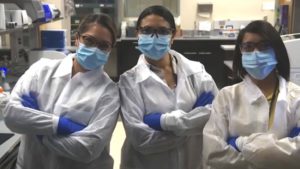
Three Latinas, Monica Mann, Elizabeth Zelaya, and Connie Maza are at the front lines of the COVID-19 pandemic. They analyze COVID-19 samples every day to track the spread of the virus and more recently to identify mutations.
These three scientists and medical technologists are part of a small team in the Department of Forensic Sciences’ Public Health Laboratory Division. When interviewed Zaleya said “Every day I reflect and I’m like, ‘Wow, this is probably going to be in a history book” and Maza stated “It is just unbelievable, the pressure we had. We were under a microscope at that point. I’m normally pretty calm when I do testing, and I mean, my manual dexterity skills are pretty good. But at that moment when I was testing COVID, I have to admit it was nerve-wracking … It was scary at first. I was very nervous.”
After years of quietly working, their lab was suddenly the center of attention as their team tested and reported Washington’s first positive COVID-19 cases. More than a year later and as new mutations spread, these scientists and their colleagues are still very much in the spotlight.
According to the National Science Board, women make up about 30% of the science and engineering workface. However, is even less for Latinos especially women; Latinos only make up 8% of the STEM workforce and only 2% are Latina women.
Today, the three scientists have each other to look for inspiration. They credit their bond for getting them through some of the toughest days of the pandemic. “We’re all hard workers here, so we go in, we stay late to finish the job. And we’re all the same. We have that same kind of work ethic” said Zelaya.
As for advice for young women, especially Latinas, they said hard work and dedication always pays off. “Keep knocking on doors. Some of them will open. They will open. And fortunately, we live in a country where you can start again from zero, career-wise, at any point of your life” said Mann.

Recent Comments